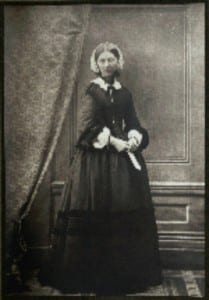A question of breeding?
By ucyow3c, on 18 November 2011
 “Put on your 19th century spectacles” was the advice given at UCL’s Petrie Museum on Thursday evening, in the last of a series of events to mark the centenary of the death of UCL’s Francis Galton.
“Put on your 19th century spectacles” was the advice given at UCL’s Petrie Museum on Thursday evening, in the last of a series of events to mark the centenary of the death of UCL’s Francis Galton.
Ben Davies tried to abandon his modern preconceptions to hear Natasha McEnroe discuss the lives and work of two “true Victorians”: Galton and his contemporary, Florence Nightingale.
If you stick to the stereotypes, the two could not be more different. Galton is best known for his pioneering work in eugenics, a discipline that is viewed as rather cold and unfeeling. Nightingale’s political campaigning is largely forgotten by the public, with the focus largely on her nursing in the Crimea.
This is not just a modern lapse. Natasha spoke of the fierce opposition to Galton’s views from the Church. Galton was no less critical of celibacy in the priesthood, baffled at the waste of intelligent, morally upright stock. Nightingale was, even in her own time, seen as an almost saintly figure, and Natasha gave an entertainingly mawkish performance of an excerpt from Longfellow’s famous poem, ‘Santa Filomena’.
Currently Director of the Florence Nightingale museum, and previously curator of UCL’s Galton Collection, Natasha had no dearth of knowledge on her subjects. She explained how they actually have a great deal in common. Both had unconventional childhoods in families from the tightly-knit ‘intellectual aristocracy’, developed a passion for statistics that shaped their work and had an overwhelming self-confidence in their own opinions.
A striking story of Nightingale’s single-mindedness involves the fate of her pet owl, Athena. After she left for the Crimea, it was found dead, having been trapped in a drawer. Nightingale’s housekeeper took it to be stuffed, and it is now in the Florence Nightingale Museum.
Galton’s interest in anthropometrics – the measuring of difference between human populations – began while he was in Africa. When he returned to London, he set up a lab in Kensington – moving later to UCL – where people would pay to have their measurements taken.
The science was so new that Galton designed many of the instruments himself; we were treated to the bizarre image of a tray of glass eyes staring out at us from the projector scheme; Galton them used to categorise eye colour into one of 16 types.
Nightingale was a pioneer in what we now call evidence-based medicine. On her return from the Crimea, she received a royal commission to investigate health in the British army, using graphic statistics to demonstrate how more casualties resulted from disease than fighting. As her co-author William Farr put it, the report expressed the firm view that “numbers teach us whether the world is ill- or well-governed”.
My 19th century spectacles felt more necessary for Galton’s views than Nightingale’s. Natasha described Galton’s firm commitment to eugenics, including his fascination with criminals and his belief that their characters were expressed in physical attributes. He was keen on preventing criminals and other ‘degenerates’ from reproducing.
Still, Nightingale was no stranger to controversial opinion. She railed against the repeated inter-marriage between families that was typical of her social circle as likely to result in “cretinism”. She was also concerned with the fact that poor families continued having children for entirely selfish motives, with no regard to the social good or public health.
However, she seems to have been more optimistic than Galton, emphasising the social ingredients of ‘degeneracy’ and, hence, the possibility of people changing for the better. Galton seems to have been a hard-line genetic determinist: if you were born of bad stock, you stood little chance of coming out well.
It is striking, given their views on reproduction, that neither ever had children of their own. Perhaps they were each so convinced by the statistics on the social dangers of reproduction that they could never bring themselves to take the risk.
Ben Davies is an intern in UCL Communications & Marketing.
 Close
Close

